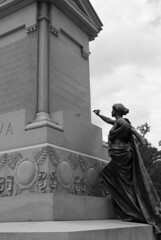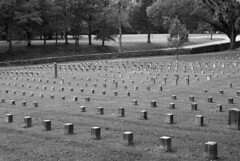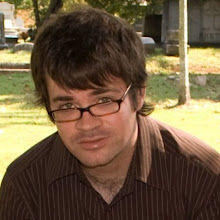So I have returned. It's been about three months since I've written. The demands of school and life conspired to distract me. But I still have a lot to say.
Last semester, as you read, I took a course on the Civil War and Reconstruction. I enjoyed it thoroughly, and got a very firm foundation in that history. My term project was a biographical paper on a local Confederate veteran, and I hope to be able to share that with you soon. There has been a recent mystery about a photograph discovered of a Civil War-era cousin in my family, depicting him wearing what appears to be a military uniform; there is no tradition that this man served in the Civil War, and the photograph poses many questions. I am taking a course in Public History this semester, for my last ever undergraduate project, and you're bound to hear a lot about that. And I hope to soon post about the recent cuts in Alabama's state budget and their harmful impact for the Alabama Department of Archives and History and historic preservation in this state.
But tonight I wanted to share with you a few recent thoughts I've had on my visit to the Shiloh battlefield last fall. In Public History we have been reading Freeman Tilden's Interpreting Our Heritage, a brilliant guide for interpretation and presentation of history through historic sites and artifacts. Our class has a generally Southern focus, though less than half of the students in it categorize themselves as Southern historians.
The discussion in class tonight was about the interpretation of disturbing events in history, such as the Holocaust or the 9/11 attacks. Should the presentation of these events withhold any of their horrors? Is it necessary to subject a visitor to horrific scenes and images—mass graves filled with mangled bodies, or terror-stricken civilians leaping from the Twin Towers to their deaths—to impart their impact? Several students noted the United States Holocaust Memorial Museum's "room of shoes", in which thousands of shoes of Holocaust victims, taken from a Nazi death camp, are displayed. It captures a glimpse of the Holocaust's enormity without a graphic image of its death. Opinions of students who had visited the exhibit varied widely, from those who found the display as a mere document of fact, to those who found it genuinely moving and disturbing.
 |
| "Written by the Hand of Fate." Iowa State Memorial at Shiloh National Military Park. |
I have not been to the Holocaust Museum, but I am sure that I would be in the latter camp. I thought back to Shiloh, how just being in that place, feeling the deathly spirit hanging over it like a blanket, disturbed me to my core. I have often wondered since then what it was I actually felt. Our professor noted that he had grown up nearby to the Antietam battlefield, and had spent countless hours on various other battlefields, but did not feel anything extraordinary merely from being there. While at Shiloh, I witnessed children frolicking on the battlefield excitedly, as if it were a park or playground. They could not feel the same oppressive air that I felt.
Did I feel something supernatural that day? Some lingering trace of the anguish and sorrow of that terrible event? And if so, why? Am I somehow, as one so attuned to the South and her history, more susceptible to such perceptions? Or was it something about the historical interpretation of the battlefield, as we are studying in my class, that moved me so? It is presented very much like a cemetery, a great memorial park, a funereal monument, and perhaps it is from this that I grasped such a feeling of despair. Or did my own mind, my own interpretation, create this feeling, from knowing what it was and knowing what had happened there? I found, after all, the appreciation for the war's horrors that I came hoping to find. But why did I need to be in the place, touching the history with my own hands, for the import of everything I had read and known to overwhelm my romantic notions and become real to me? Sometimes, it is indeed sites and objects that speak to us even more than facts. This, according to Tilden, is the essence of historical interpretation.
 |
| Unknown Dead of Shiloh. |
Or I could be, as someone suggested in class today, just a "softie." But the fact remains that Shiloh changed me, and the Civil War will never be the same to me again. I cannot think of it without remembering the overwhelming horror and revulsion I felt at Shiloh. And I wouldn't want to. It will keep honest a historian so prone to romance.





1 comment:
Very insightful. Thanks for writing it.
Post a Comment